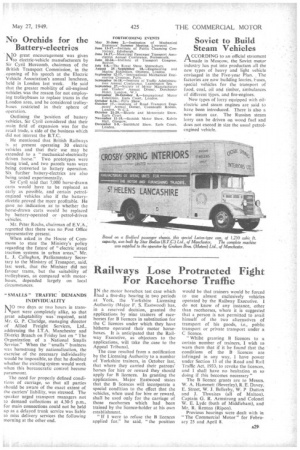No Orchids for the Battery-electrics
Page 5

If you've noticed an error in this article please click here to report it so we can fix it.
N°great encouragement was given to electric-vehicle manufacturers by Sir Cyril Hurcomb, chairman of the British Transport Commission, in the opening of his speech at the Electric Vehicle Association's annual luncheon,
held in London last week. He said that the greater mobility of oil-engined vehicles was the reason for not employing trolleybuses to replace trams in the London area, and he considered trolleybuses restricted in their sphere of operation.
Outlining the 'position of battery vehicles, Sir Cyril considered that their main field of expansion was for the retail trade, a side of the business which did not interest the B.T.C.
He mentioned that British Railways is at present operating 30 electric vehicles and that their use may be extended to a "mechanical-electrically driven horse." Two prototypes were being tried, and two parcels vans were being converted to battery operation. Six further battery-electrics are also being tested experimentally.
Sir Cyril said that 7,000 horse-drawn carts would have to be replaced as early as possible, and certain petrol-' cngined vehicles also if the batteryelectric proved the more profitable. He gave no indication ,as' to whether the horse-drawn carts would be replaced by battery-operated or petrol-driven vehicles.
Mr. Peter Rochs, chairman of E.V.A., regretted that there was no Post Office representative present.
When asked in the House of Commons to state the 'Ministry's policy regarding the futureof "electric street traction systems in urban areas," Mr. L. J. Callaghan, Parliamentary Secretary to the Ministry of Transport, said, last week, that the Minister did not favour trams, but the suitability of trolleybuses, as compared with motorbuses, depended largely on local circumstances.
"SMALLS" TRAFFIC DEMANDS INDIVIDUALITY
NO two days or two hours in transport were completely alike, so that great adaptability was required, said Mr. G. P. Claridge, managing director of Allied Freight Services, Ltd.. addressing the I.T.A. Manchester and District Branch on Friday last on "The Organization of a National Smalls Service." When the " smalls " business was hamstrung by nationalization, the exercise of the necessary individuality would be impossible, so that he doubted whether the existing system would work when this bureaucratic control became paramount.
The need for properly defined conditions of carriage, so that all parties should be aware of the exact extent of the carriers' liability, was stressed. The speaker urged transport managers not to demand collections at 4.30-5 p.m., for main connections could not be held up as a delayed trunk service was liable to miss delivery services the following morning at the other end.


























